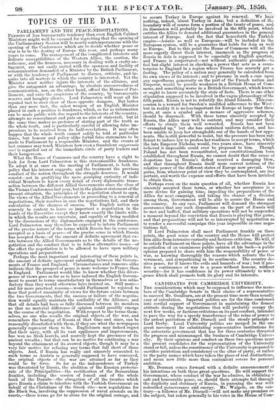CANDIDATES FOR CAMBRIDGE UNIVERSITY.
Tim considerations which may be supposed to influence the mem- bers of the Cambridge Senate in their choice of a representative to succeed Mr. Gonlburn, are at the present time more than usually easy of calculation. Imperial polities are for the time condensed into cordial support of Government in maintaining the firmest attitude during the negotiations that will probably occupy the next few weeks, or factious criticisms on its past conduct, intended to pave the way for a speedy transference of the reins of power to the ardent patriotism of Mr. Disraeli and the steady principle of Lord Derby. Local University polities are mergec in the one great movement for substituting representative institutions for the autocratic government that has for three centuries thwarted the progress and mismanaged the business of Cambridge Univer- sity. By their opinions and conduct on these two questions must the present candidates for the representation of the University stand or fall, unless the constituency of the University is prepared to sacrifice patriotism and consistency on the altar of party, or rather to the party names which have taken the place of real distinctions, and mean now little more than convenient covers for personal ambition.
Mr. Denman comes forward. with a definite announcement of his intentions on both these great questions. He will support the Government, whose conduct of the war he admires, in obtaining a safe and honourable peace, or, should their attempts fail through the duplicity and obstinacy of Russia, in pursuing the war with redoubled perseverance and energy. Mr. Walpole, on the con- trary—a follower of Mr. Disraeli—will not make any promises on the subject, but refers generally to his votes in the House of Corn-
mons. We know no principle that will explain Mr. Walpole's conduct in relation to the Russian war, except thoroughgoing partisanship, sending him along with the worse section of his party, and not with that respectable portion of the Conservatives who prefer the honour of their country to the gratification of party pique or the promotion of party interests.
On the University question Mr. Denman expresses himself with plainness and earnestness. He uses the habitual language of a genuine University Reformer, and hits the kernel of the question when he pledges himself to do his utmost to secure for the Uni- versity representative institutions. All we are allowed to know of Mr. Walpole's sentiments on this most important subject is, that we may, if we please, consult his votes. That process completed, we find Mr. Walpole systematically doing his best to mutilate the Oxford Bill in its passage through the House ; and we are much mistaken if to his distinguished efforts on that occasion he is not indebted for the zealous devotion of certain well-known resi- dents, whom nothing would induce to support a University Re- former, unless it were the opportunity of persecuting a heretic.
If from these two questions we pass to the more general politics of our time, we find Mr. Denman professing himself no party- man, and refusing those premature pledges which bind the repre- sentative to abdicate his judgment of circumstances. His prin- ciples he describes by the now familiar phrase of Liberal but Conservative. On the other hand, Mr. Walpole is bound to a party by the strongest Ilea. His past career, to which he appeals, gua- rantees his future. He will follow wherever Mr. Disraeli leads, except when by chance his leader strays into some ethnological Li- beralism, of which Mr. Walpole is utterly incapable ;—though even Mr. Walpole had his errant impulses, when, while a member of a retrogressive Government, he astounded his friends by pro- posing to bestow the franchise on every raw country lad whom the bounty seduced into the Militia!
Between two candidates whose public position is thus broadly characterized and contrasted, the University of Cambridge is called on to choose, at an important period of the national history and its own development. To prefer Mr. Walpole, would show a careless indifference whether the Government be supported and the University reformed. Moreover, Mr. Denman seems to have qualifications that should win strong sympathies from such a constituency as he is appealing to. He united an academical career marked with the highest honours to a personal popularity founded on that manly character which enters so largely into the success in life of ambitious Eng- lishmen. Against these qualifications we must in fairness put his comparative want of political reputation. But the University is not like a common constituency, which requires the stamp of vulgar approval to be fixed on a man before discerning his ster- ling qualities. Mr. Denman is the sort of man excluded from common constituencies till he have attained high rank at the bar. He has little but his own distinguished talents to recommend him ; and it will be creditable to the University to place a com- paratively young man in Parliament, whose talents its own sys- tem has trained, who owes to it his first distinctions, and who will devote to its interests the unbiased judgment and unfettered energy which are not to be expected from a party-man however respectable his character, however fluent his oratory, however successful his political career.



























 Previous page
Previous page